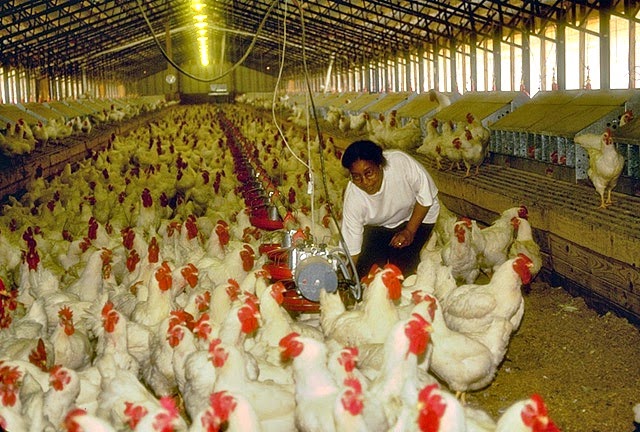Bird Flu Poses Little Threat to People: CDC
Genetic analysis indicates public shouldn’t be alarmed, ‘cautiously optimistic’ health officials say
By Steven Reinberg
HealthDay Reporter
WEDNESDAY, April 22, 2015 (HealthDay News) — The bird flu outbreak that has resulted in the slaughter of millions of chickens and turkeys in the United States has little chance of sickening humans, federal health officials said Wednesday.
Widget not in any sidebars
The reason: the genetic makeup of the virus behind the outbreak is different from other bird flu viruses that have sickened more than 600 people in 15 countries, according to Dr. Alicia Fry, an epidemiologist and medical officer with the U.S. Centers for Disease Control and Prevention’s National Center for Immunization and Respiratory Diseases.
“The CDC considers the risk to humans to be low,” Fry said during a morning media briefing. But it’s possible there could be some human infections, particularly among farm workers handling infected poultry, she said.
Bird flu is spread by wild birds, particularly waterfowl. The outbreaks outside the United States have occurred in Asia, Africa, the Near East and parts of Europe, according to the CDC.
The bird flu outbreak in the United States began late last year and is the worst in years. In the past two weeks, there has been a sharp rise in the number of cases in Midwest states such as Iowa, Minnesota and Wisconsin, the Wall Street Journal reported.
Fry said little is known about the H5N2 virus present in the United States because it has only recently been identified. “But we do know that if we look at their genes, we don’t see any genetic markers that in the past have been associated with transmission to humans,” she said. “So that’s a good sign.”
Just in case, the CDC is collecting samples of the virus and its assorted strains to see which ones might be good candidates for a possible human vaccine should one be needed. This is a first step in making a vaccine, but at this time the agency has no plans to go beyond this preliminary work, she said.
 “We are cautiously optimistic that we will not see any human cases, but there is certainly a possibility that we may,” Fry said.
“We are cautiously optimistic that we will not see any human cases, but there is certainly a possibility that we may,” Fry said.
The best advice the CDC has for the general public is to avoid contact with wild birds and chickens or turkeys that appear sick or have died.
Also at the media briefing, Dr. John Clifford, chief veterinary officer at the U.S. Department of Agriculture, said the nation’s food supply is safe. “These birds are not going into the human food supply,” he said.
The Department of Agriculture is taking several steps to control the outbreak, including developing a test to detect the virus and a vaccine to protect chickens and turkeys, Dr. David Swayne, director of the USDA’s Southeast Poultry Research Lab, said during the briefing.
Clifford said the virus is likely to disappear as warmer weather arrives across the country. “This virus doesn’t like heat, so when it gets hotter this virus doesn’t survive easily,” he said.
Swayne added that the virus also doesn’t like sunlight. So as the days grow longer, that will put even more strain on the virus. “As we get into the spring and summer we get a lot more sunshine, and with sunshine comes more ultraviolet light and ultraviolet light will kill influenza virus,” he said.
Whether the fall will see a new outbreak of bird flu is unknown, the officials said.
“We can’t really predict what is going to happen,” Swayne said. “Once birds go to their northern breeding grounds, it’s really not sure if they will bring the virus back in the fall.”
More information
For more on bird flu, visit the U.S. Centers for Disease Control and Prevention.
SOURCES: April 22, 2015, media briefing with Alicia Fry, M.D., epidemiology and prevention branch medical officer, Influenza Division, U.S. Centers for Disease Control and Prevention; John Clifford, D.V.M., chief veterinary officer, U.S. Department of Agriculture; David Swayne, D.V.M., director, Southeast Poultry Research Lab, U.S. Department of Agriculture; Wall Street Journal
Last Updated: April 22, 2015
Copyright © 2015 HealthDay. All rights reserved.




